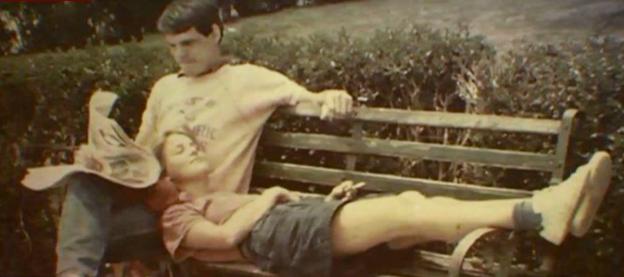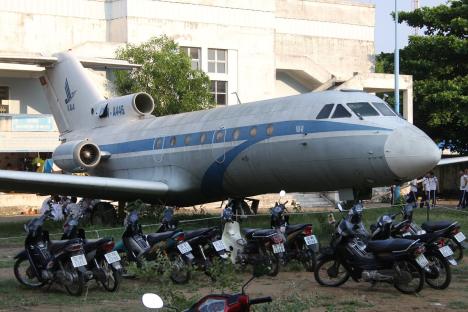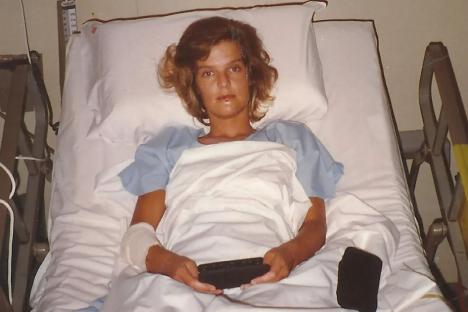OPENING her eyes, Annette Herfkens took in the chaotic scene before her.
The cockpit of the plane she had been travelling in minutes earlier had been ripped away, and the rugged terrain of the Vietnamese jungle was visible through the front of the torn fuselage.




She had boarded the Vietnam Airlines flight 474 at 7:50am on the morning of November 14, 1992, with her fiancé Willem van der Pas – nicknamed Pasje – who’d planned a romantic getaway to the South China Sea in .
The couple, both investment bankers, had been together 13 years and were giving themselves a well-deserved break after six months of working in different countries, before they got married.
“We were young,”; said Annette. “We had our life in front of us. That’s what we thought. But things turned out very different.”;
The plane took off from Ho Chi Minh City for the 55-minute trip to the scenic coastal town of Nha Trang, with 25 passengers and six crew members on board.
Feeling claustrophobic, Annette, then 31, didn’t fasten her seatbelt – a decision that may well have saved her life.
Five minutes before they were scheduled to land, she told how the plane suddenly dropped.
“People were screaming. Pasje looked at me, scared,”; Annette recalled.
“I reassured him. I said, ‘It makes sense, it’s a small plane, it’s probably just an air pocket.’
“But there was another drop. He reached for my hand, and everything went black.
“It goes so fast. You don’t even have time to see your life in front of you, or to think of anything, frankly.
“You just have a realisation – but realisation doesn’t leave time for thoughts.It’s not a scary moment. You don’t feel much.”;
Speaking in the wake of the tragic disaster, which last week, with , Annette is keen to stress that those who perished on board probably felt a similar way in their final moments, in the hope it gives their comfort.
Annette’s plane, a 16-year-old Soviet-made Yakolev Yak-40, was flying below minimum safe altitude on its approach to Nha Trang Airport during bad weather when it clipped trees and into a mountain ridge.
She said the “bad part”; was waking up to what was left of the plane – and its passengers.
“One moment I was flying with the sound of the plane’s engines. Next I wake up to the eerie sounds of the jungle,”; she recalled.
“I open my eyes, and see complete chaos. The cockpit had broken off, so I could see the jungle growth through the front of the fuselage.
“There was something heavy on top of me, so I push it off. It turns out to be a dead man.
“I look to my left, and there I see my fiance still strapped in his chair, dead, with a very sweet, beautiful smile on his face.”;
Stench of death




Because others were wearing their seat belts, their ribs had been pushed deep into their lungs on impact.
Annette was badly injured – with 12 broken bones in her hip alone, a collapsed lung and a broken jaw – but alive.
The next thing she remembers is lying on the jungle floor, with the fuselage about 10 metres behind her up the mountain.
She wasn’t the only one to survive the initial impact.
“I heard people behind me moaning,”; she recalled. “Next to me there was a Vietnamese man talking to me in English.
I had such a big wound on my shin that I could see the bones sticking out, and the flesh, like in a biology textbook. It really, really hurt like hell
Annette Herfkens
“I said, ‘Do you think the rescuers will come?’. He was very comforting. He said, ‘Yes, I’m a very important man. They will come for me.’
“My skirt had fallen off, and he opened his suitcase and he lent me his suit trousers.
“I had such a big wound on my shin that I could see the bones sticking out, and the flesh, like in a biology textbook. It really, really hurt like hell.”;
It would be eight long days before Annette was found, and she credits her remarkable survival to her decision to follow her instincts and accept her fate.
“I was just immediately accepting the fact that I was there, telling myself, ‘Hey, you are here in the jungle and you’re not on the beach with your fiance’,”; she said.
“We all have that instinct in us to do the right thing, to forget ego, and follow your instinct.
“And then I told myself, ‘Don’t think of Pasje, don’t think of Pasje. That will make you cry. But you cannot cry right now.’

“So instead of dwelling on where I should have been, I stayed in the now. I focused on what was right in front of me, and that was a beautiful jungle. I really focused on the beautiful leaves.
“I was not a hiker – I was a businesswoman, used to shopping around the world in Hong Kong, , . And now all of a sudden I’m in this nature and I think, ‘Wow, this is nice’.”;
Eventually, the moans of others around her turned to silence.
“I’m sitting next to the Vietnamese businessman, when I realised there was this terrible smell,”; she said. “There was a maggot coming out of his eye.
“Crawling on my elbows, I pass him, and another dead man, and a dead Vietnamese girl.
“Dragging my body along, I settled on the wing of the plane that had come loose.
I’m sitting next to the Vietnamese businessman, when I realised there was this terrible smell. There was a maggot coming out of his eye
Annette Herfkens
“I must have fainted then, because I was in so much pain. But I realised how important it was that I was alive and kicking, and that I had to stay alive.”;
Annette knew she had to make a plan, and gave herself one week to make it back to civilisation, and settled herself under an opening in the trees that would allow rescuers to spot her.
Her priority then became working out how to get water.
“I looked at the wing of the plane and realised that the insulation material was some kind of foam. I grabbed onto it. In all that pain,”; she recalled.
“I figured that those balls could work like a sponge when it would rain. So those seven little balls kept me through the day. Just enough water.
“That was the plan – they say it’s good for survivors to divide it into feasible steps, and to congratulate yourself when you reach one of those steps.
“You have to keep a sense of humour, too. I was very much making fun of myself, ‘Look at you, you can’t even sit through a blow dry. And here you are’.”;



As the days went by, with only the small amount of rain water she managed to collect in her insulation balls keeping her alive, Annette grew weaker.
But she willed herself to remain in the present and take it moment by moment.
On day six she recalled having a “beautiful ”; which she likened to an “orgasm”;.
“The more I focused on the beauty of that jungle, the more I saw how the light hit the leaves. I focused, and zoomed further and further in,”; she said.
“I wasn’t eating, I had very little water. But I got into this higher state of mind, and I became part of the jungle.
“I slowly floated to death. It’s a beautiful wavelength. Maybe it feels like tripping, or like an orgasm. It was so beautiful that I didn’t want to get out of it.”;
Then Annette saw someone – a man dressed in orange around ten yards away from her.
She thought she might have been hallucinating.But he was real.
“I really had to fight to focus on him and to get out of my beautiful state of mind,”; she said.
“I was really happy to leave Earth in that moment. But he made me realise that my family would have never known that I was alive had I just died there.
“I just wanted to go back, for the love of my family.I needed to come back. I needed to stay alive.”;
The man was Cao Van Hahn, a Vietnamese policeman who raised the alarm, and after eight days in the jungle, Annette was rescued.
“They gave me a sip of water, which was like the best champagne,”; she said.

Annette was transferred to a local hospital in Ho Chi Minh before being moved to a larger one in .
Family and friends flew in from around the world – but it was now that Annette’s enormous personal loss hit home.
At Pasje’s his friends carried his coffin, while Annette followed behind on a stretcher.
“For me, it was like I was marrying a corpse,”; she remembered.
Within three months Annette had returned to her office in Madrid and continued to build her career as a banker, eventually finding love again with a colleague, Jaime, with whom she had two children and moved to New York.
Her experience has made her incredibly resilient. When her son Max was diagnosed with aged two, she accepted the circumstances instead of fighting them, just as she’d done in the jungle.
She also drew on her experience to cope with three miscarriages and her divorce from Jaime – who died from cancer in 2021 on the anniversary of Pasje’s death.
Annette has also returned to Vietnam twice – in 2006, and in 2014.
She added: “Every year, on November 14, for the next eight days I count how much I eat and drink.And I’m grateful.
“Your mind makes up stories, soap operas. But you have to silence that voice and listen to the other voice.
“You can call that the voice of God, your instinct, your higher self – but it tells you what to do. And it saved my life.”;









